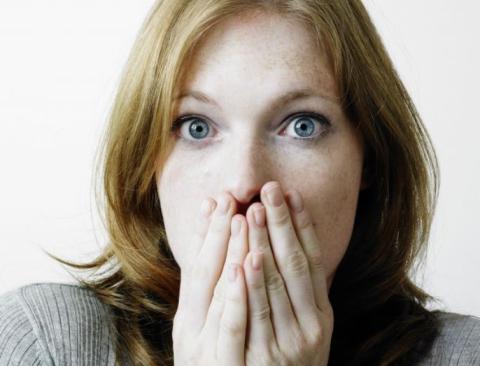As an American, I am quite comfortable with discussing one’s medical history. Like any true American, I watch surgeries on the Discovery channel and marvel at what doctors can do these days. I commiserate with friends and families about the horrible things that happen to a body riddled with disease. I watch astutely the instant replays of someone’s shoulder being dislocated in a football game. They are tough subjects, but I’m a tough person. It doesn’t shake me. It’s riveting.
What I didn’t realize in my first eight months in Italy is that Italians don’t share this fascination with medical predicaments
“Mom’s medication makes her tired but she’s good,” I’ll reply to the mundane question of ‘how are your parents?’
“Oh, is she sick?” they’ll ask.
“She has breast cancer,” I’ll answer plainly.
In the States, when I mention the word cancer, it usually launches a conversation full of reassuring information and comforting support. But in Italy, I get a different response.
“Oh,” they’ll gasp as they change the subject or walk away.
I found this odd.
“Your Grandma died young,” I said to Massimo after lunch one day. “What did she die from?”
“I don’t know,” Massimo said. “She had pain.”
It took me a few weeks to uncover that she had a “tumor in her uterus.”
“Oh no,” I said to my mother-in-law. “Your mother had uterine cancer. I’m so sorry to hear that.”
At the words uterine cancer, my mother-in-law went white and quickly looked away. She walked to the kitchen and started taking plates out. I couldn’t understand why, we had just eaten a four course lunch.
“Want some cake?” She asked. “I made it myself. It won’t disturb you.”
I was surprised by her need for food but figured it was still hard for her to talk about it even though nearly thirty years had passed.
Massimo’s Dad had a “problem with his kidney.” They removed one kidney. No further treatment needed.
I pressed Massimo. Was he sure his Dad was getting the best possible care? How do they just remove cancer and do nothing else?
“Maybe it wasn’t cancer Kristi. No one ever said it was cancer.”
“Massimo, it was cancer. You know - if it walks like a duck…”
He asked his sister the nurse, who responded, “That it was merely a tumor that’s been removed.”
A benign tumor required the removal of an entire kidney? My doubts regarding socialized medicine, Italy’s in particular, grew.
“Rosa’s Dad has cancer.” I heard on one of my walks with the neighbor ladies.
“What kind of cancer?” I asked, intrigued by the use of the “C” word.
I received looks as if the grim reaper were asking them to recount the details of his gruesome deeds. The others seemed to pick up their pace to distance themselves.
Finally, my sister-in-law the nurse said, “I don’t know. I’m not an expert.”
“I was just curious how serious it is.”
“All cancer is serious, Kristi,” she shot back.
“Yes, of course. But some have good survival rates and others can be managed with medicine.” She looked at me sideways and kept walking. “My Mom’s cancer spread to her lungs but they’re managing it with medicine,” I continued.
The silence was palpable. Eventually they returned to the normal chatter about what they ate for lunch and what they’ll have for dinner. I tried to determine where I went wrong.
“Massimo,” I asked later that night. “How come Italians don’t talk about cancer?”
“They do, but it’s not pleasant so they don’t talk about it much. Cancer is something terminal. Immediate.”
“Is that why people always emphasize that it’s a tumor instead of cancer?”
“Yeah, a tumor is…treatable,” Massimo said.
“Oh, so when I say my Mom has cancer I’m a horrible person for abandoning her.” I asked.
“Pretty much,” Massimo responded.
“And since a tumor can be removed, the type of tumor is irrelevant?” I asked.
“Yep.”
“But don’t they want to know more about what they have? Treatments. Side effects.”
“Italians want to know if everyone is happy, eating well…”
“And what you ate,” I interrupted.
“Yes,” he smiled. “It’s not that Italians don’t know about cancer. It’s just that it’s a depressing subject and we want our conversations to be fun, uplifting,” Massimo explained. “It’s better for the patient if everyone is happy instead of worried.”
This was a foreign concept for me. I’ve often complained about the information overload we get in the States. Yet I expect it and would demand more information if I thought I wasn’t on overload. My Italian counterparts prefer to let the doctors worry about the medical problems so the patient can relax and enjoy their time. Ignorance is bliss, after all.
I’ve since learned to say, “Mom’s tumor was removed. She has a very small tumor in her lungs but it’s too small to biopsy. She’s doing great.”
People smile, congratulate me, and send wishes to my Mom. I have to say, while I’m still expecting American responses, the Italian responses feel pretty good. And it does seem less dire to phrase her situation the Italian way.
I am slowly shedding my social leprosy in this foreign country, but I fear it may be a slow process.




